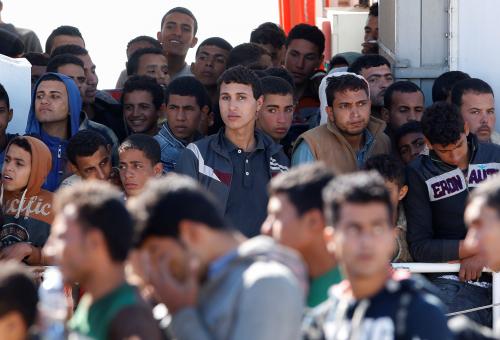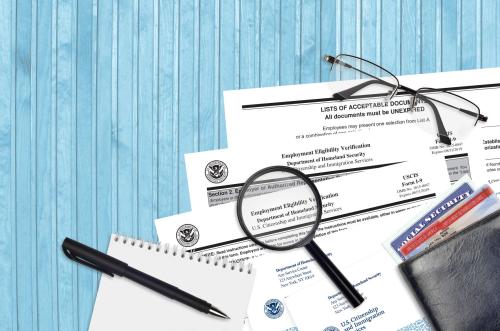In the run-up to the referendum it eventually narrowly won, Britain’s “leave” campaign skillfully played the migration card. Britain, the narrative went, has been invaded by illegal (read: Muslim and poor) immigrants, asylum seekers from war-torn countries, and bogeymen Polish plumbers. As the barbarian hordes descended on Little England, Leave campaigners claimed, they replaced quintessentially British values—whatever those might be—with shariah law, brought terrorism to British cities, and stole British jobs. Data that contradicted these claims was never of much interest to Brexit supporters, and their grotesque narrative won the day: 52 percent of the electorate voted to leave the European Union.
What can a post-Brexit Britain hope to achieve on migration policy? There’s a fair amount of elbow room on asylum and refugee policy, as well as on broader migration policy—but policy changes in those areas could negatively affect the rights of asylum seekers as well as of people whom Britain’s economy desperately needs. And on access to the EU single market and freedom of movement, British leaders won’t be able to have their cake and eat it too.
Asylum and refugee policy
The United Kingdom always had a rather ambivalent relationship with the European Convention on Human Rights (ECHR). In fact, just a couple of months before becoming prime minister, Theresa May argued in favor of the United Kingdom leaving the ECHR altogether—that says it all about the current political climate in Westminster. It’s no wonder that top human rights lawyers in London now fear that, as prime minister, she may eventually act on that view.
The post-referendum hullaballoo prompted Leave campaigners to conflate the ECHR, economic immigration, and refugee issues, stirring some kind of incoherent intellectual melting pot. Meanwhile, the new “Brexit government” will need to look into the EU’s Common European Asylum System. While some adjustments will be inevitable, Britain’s asylum and refugee policies are already fairly compatible with broader European norms. Britain will have to substitute the Dublin and the EURODAC regulations with new national legislation, but it could do so in a way that makes it compatible with the EU’s Common European Asylum System. At the same time, the U.K. could in theory also keep the current directives on qualification, asylum procedures, and reception conditions as part of its own national legislation.
As Britain drifts further out into the Atlantic and away from Europe, London will inevitably have to reform its asylum and refugee policies. But because of the xenophobic political narrative skillfully promoted by the Leave campaign, the British government will come under extraordinary pressure to completely overhaul its asylum and refugee policies. Theresa May’s remarks and the prevailing political wind suggest there is a distinct risk that the rights of asylum seekers and refugees alike might be negatively affected in the process.
Broader migration policy
Leave campaigners called for a points system to curb the yearly number of arrivals in the United Kingdom from the “hundreds of thousands” to the “tens of thousands.” What the proponents of the points system failed to point out (or even just understand) is that such an approach is not necessarily aimed at reducing migration. Rather, it is most frequently about selecting immigrants.
Experience from Australia, Canada, and New Zealand provides important lessons in this respect. To begin with, immigration into all these three countries increased—not decreased—over the years when points systems were in place. Had the objective of introducing a points system really been to decrease immigration numbers, such a policy would probably have been discontinued in all these three countries. Secondly, points systems give central governments—rather than potential employers—a greater say on which criteria should be used to determine which specific skills might be most in demand within the country. It’s doubtful that the government in London is better positioned than individual employers to understand which skills companies might need. Finally, a points system that’s too skewed toward white collar, high-paying jobs would deprive the British economy of those European workers that have so far provided crucial services to the British economy. Getting rid of Polish plumbers and Spanish waiters could potentially translate into a shortfall of cheap labor in these crucial industries.
At the end of the day, it will probably be the serious economic downturn caused by years of uncertainty following the Brexit referendum—rather than misguided policy decisions—that will reduce immigration to Britain.
European freedom of movement
This is the very difficult one to pull off: Together with that of goods, capital, and services, the free movement of people is one of the pillars of the European Union’s single market. Both before and after the referendum, virtually all European heads of government made their position very clear to Britain: Rights and duties go hand in hand, and Britain will not be allowed to cherry-pick its access to the single market while at the same time undermining Europe’s freedom of movement.
The evidence so far suggests that they have tended to stick to that philosophy. Look at trade arrangements between the EU and other countries: at the one hand of the spectrum, Norway has virtually unrestricted access to the single market but must comply with the overwhelming majority of EU legislation, pay into the EU budget, and guarantee the free movement of people. At the other hand of the spectrum, non-EU countries that rely on WTO rules have regulatory independence from the EU (and of course don’t pay into its budget or necessarily grant freedom of movement to European citizens), but pay EU common external tariffs and don’t enjoy free trade in the service sector, which could cripple London’s financial sector. Switzerland, Canada, and Turkey all fall somewhere along this spectrum.
Posturing aside, the U.K. and EU will need to find a solution eventually. The European Union might allow Britain to impose (partial) limits on the free movement of people in exchange for (limited) access to the single market. But do not expect any favors. For Berlin, Paris, Rome, Madrid, and Warsaw to agree to any concessions, London will most likely be made to pay a very high price.
Brexit supporters made the “immigrant threat” one of the centerpieces of their campaign strategy. It paid off. Having gleefully disregarded any factual evidence on the subject for so long, campaigners-turned-government-ministers might now find it hard to deliver on their promises of drastically reducing immigration into the United Kingdom. To keep their word, they might end up hurting an economy already headed for recession. Alternatively, they might relent on their promise and infuriate the white, poor, elderly, uneducated men from rural England that voted for Brexit. Either way, this Brexit government will disappoint many.







Commentary
What Brexit means for migration policy
September 26, 2016